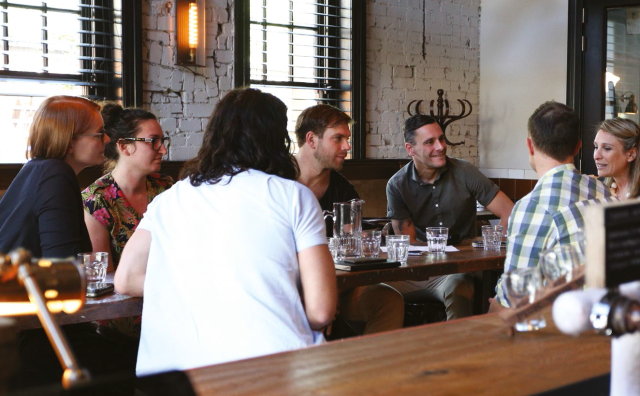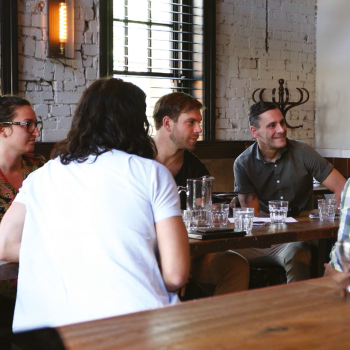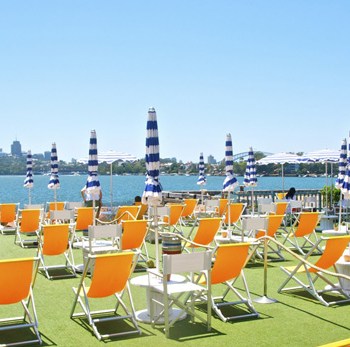We gathered some of the best in the industry – from bar group operators to managers to brand ambassadors to a bar journo and a PR expert – to find out what exactly goes into pulling all the threads together into a cohesive and great bar operation.
THE PANEL
• Emily Lloyd-Tait, Time Out Bars Editor for Sydney
• Meg Smith, SideCar
• Toby Hilton, Swillhouse
• Michael Nouri, The Exchange
• Jeremy Shipley, Solotel
• Russ McFadden, Bar Manager of EDV Sydney
BACK ROOM
MN: Keep it out of the customers’ faces. As much as possible. One big thing for me is the attitude of the staff – I’ve been to plenty of bars that could be great but I don’t want to hear the conversation about breaks, staff times, wages, or manager mix ups – whatever. That shit should never happen in front of a customer. Ever. It’s so basic but so many places do it.
RM: The one thing that I hate – if you can’t sell it and you can’t make a drink with it, why can I see it? Walking in and seeing cigarettes or people’s wallets or spare till rolls stacked up – it’s not Officeworks. Also, standing within earshot of a table speaking about how hammered you were last night – don’t do that. Unfortunately a lot of this basic stuff just isn’t taught anymore. Like washing your hands every time you step back behind the bar, regardless of what you’ve been doing, because people see it.
MS: Cleaning gear on the bar. It’s a given that your place is clean – I don’t want to see the Spray & Wipe. And smoking outside your bar – don’t do that. If you don’t have enough pride in your venue to go away and do that somewhere else, what are you doing?
TH: With stock – don’t say “Oh sorry we don’t have that, Johnno forgot to order it”. Customers don’t need to know that. Just say “Haven’t got that at the moment but how about this one, it’s just the same”. Easy. In general, it’s all about having tight procedures back of house to stop your business from being clunky and keep everything running smoothly. Back of house should never
affect front of house.
YOU CAN’T SIT WITH US
TH: I think the whole reservations and private functions thing can make you feel pretty unwelcome. When half a place is booked out when you walk in and you think, oh cool it’s not too busy but then it’s like “Oh you can’t sit there and you can’t sit there”. Being told no is the worst. You just want to go in, find yourself a seat and you’re ready to go.
RM: As of very recently we’re trying to cut out reservations. It’s going to be tough to do it completely, but it’s that fine line of how do we guarantee cash coming through, but also how do we not have that situation where we’ve got five people come in and we have to tell them they can’t sit somewhere because someone else is going to sit there and you’re less important?
TO THEME OR NOT?
RM: It depends on how far you want to go. Whether or not it stays on trend, whether or not it stays relevant, it depends on what you do. Will it still be relevant in 10 years time, quite possibly. You have to careful with it. You have to compromise sometimes so that you are still a venue that people want to go to all the time.
TH: I feel like a bar needs a story. If not a theme it needs some sort of identity. What are you? And that is a theme in itself. It could be the most subtle thing ever, but every bar needs it, so to speak. It can be all different levels. As far as a real theme bar goes, the danger is to not commit to it and to not do it well. If you do it half arsed, people walk in and go “this is shit”.
JS: I think we all love a theme bar. But it’s not something that you go to all the time. If you do it you’ve got to be mindful that you have to stick to what you’re trying to do and not change it. If you want to be a tiki bar then be a tiki bar. Don’t change it in six months time. And if you’re going to be a 1920s bar then that is your vibe and you can’t just pull out the hip hop halfway through the night. Unless that is what you’re going for – to confuse the shit out of people.
ELT: People like guidelines to a degree. For theme bars in general, Love Tilly Devine is a great example. There isn’t anything really themed about the bar per se, but it fits with the story and name gives out a clue of what to expect and when you turn up you’re like “yep, this is just a room – ok, this is what we’re doing and I’m into it”. But doing almost nothing they’ve kind of formed that identity. Rather than a theme, it has an identity.
MS: It comes down to how the bar makes you feel – whether it is themed or not. Shady Pines is a great example. Yes it is Americana and yes whenever friends are in town I take them there because there is nothing else like it but I don’t go there because I feel like having a hoedown. It has great atmosphere.
DON’T FORGET…
MS: Lighting, lighting, lighting. There are a lot of places that do it right, but there are too many that don’t. If it’s too bright it is less intimate. Lighting sets the tone for everything else. And proper staff product training. Make sure everyone is across the portfolio.
TH: Lighting is so important. You can get everything else right, but if you don’t nail the lighting… it’s wrecked. Some people are really affected by it, they can’t relax. But also don’t make it too dark.
MN: Think about why you’re doing it. Really think. Because it is going to own you and every day of your life. Look past face value and at what you really want.
ELT: Access to the menu is really important if you don’t have anyone on the floor. If people have to stand and queue and when they get to the front and there is nothing there to guide them, they’re going to be lost and uncomfortable. It makes people feel like they don’t get the bar but also it slows your service rate down. And it’s something that I notice all the time. People umming and ahhhing at the bar – tell them what you have.
RM: You need staff who understand what you’re doing and why, and being able to relay that to the customer. If you only have four wines because you work closely with local producers, your staff need to be able to convey that.
TH: Back of house can get over-looked by first time operators just because they’re not used to it – just keeping an eye on stock and costs. They might have a really busy bar and come end of month there isn’t much money in the bank, but they’re just not keeping an eye on their costs and what they’re charging.
See Part 2 here…



